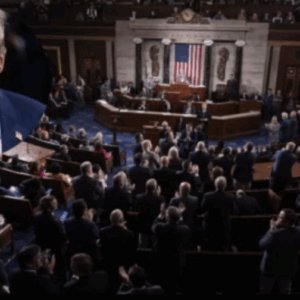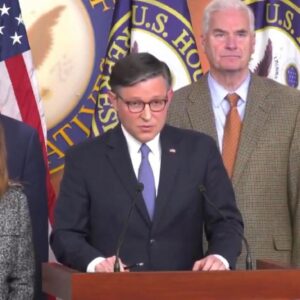The House chamber fell into an unusual silence as Representative Marjorie Taylor Greene approached the podium, signaling that a significant statement was about to be made. Those accustomed to her fiery speeches could sense immediately that the moment carried a heightened intensity, drawing the attention of colleagues and reporters alike.
Greene began by referencing the survivors connected to the Jeffrey Epstein case, asserting that they “know the names” of those involved. Her words were delivered with conviction, emphasizing that the information was already known to the people directly affected, though not yet fully revealed to the public.
Shifting focus, she directed her criticism toward major government institutions, including the Department of Justice and the CIA. Greene suggested that these agencies had failed to act with transparency and accountability, implying that crucial information remained hidden or suppressed. Her voice carried a tone of urgency as she elaborated on what she viewed as systemic inaction.
She further accused certain New York judges of complicity, claiming that they had contributed to a lack of justice and clarity in the Epstein case. Her critique extended beyond national borders as she alleged that foreign governments had also participated in shielding influential individuals connected to Epstein’s network, though she did not specify which nations or provide concrete evidence during her remarks.
According to Greene, these combined failures created an environment where what she described as an “elite trafficking ring” continued to operate with protection from powerful entities. Her rhetoric was forceful and unflinching, painting a picture of institutional neglect on a global scale.
Midway through her speech, Greene transitioned from making accusations to making a personal pledge. She reminded her audience that she had previously vowed to take public action if she believed information was being intentionally withheld. The tension in the chamber grew palpable as listeners realized the seriousness of her statement.
She then delivered her most dramatic declaration: should the agencies and governments she criticized continue to obstruct the truth, she promised to read “every single one of those names” aloud on the House floor. The words were delivered with deliberate emphasis, signaling a direct challenge to those in positions of power.
The immediate reaction was one of divided attention. Supporters praised Greene for her courage and willingness to confront perceived wrongdoing, framing her speech as a necessary step toward transparency. They argued that her actions reflected the frustrations of a public that has long demanded accountability in high-profile cases like Epstein’s.
Critics, on the other hand, expressed concern over the potential consequences of publicly naming individuals without legal adjudication. They warned that her approach risked spreading unverified accusations and could interfere with ongoing legal processes, raising questions about the propriety and safety of her threat.
Regardless of perspective, Greene’s remarks succeeded in capturing national attention. Her speech intensified the ongoing discussion about the Epstein case, government transparency, and accountability, ensuring that the issue would remain a central topic in political discourse. Whether her promise will be acted upon remains uncertain, but the statement has undoubtedly added a dramatic chapter to the continuing conversation.





